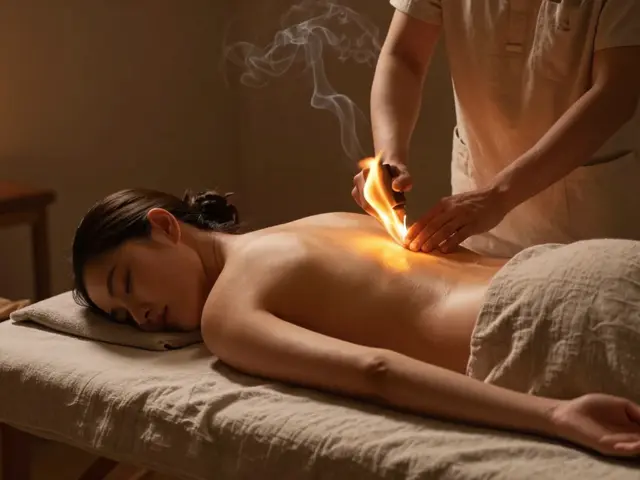In recent years, an unexpected wellness therapy has been capturing the curious hearts of adventurers and relaxation seekers alike—the elephant massage. This fascinating practice not only offers the soothing benefits associated with massages but elevates it with the gentle touch of one of the earth's most majestic creatures. Originating from the serene landscapes of Thailand and other parts of Southeast Asia, the curious phenomenon of elephant massage is gaining popularity beyond its birthplace.
For those looking to escape the conventional spa experience, elephant massage provides an exotic and authentic alternative. Nestled within the grounds of reputable wildlife sanctuaries, participants are given the chance to lie back and experience the surprisingly gentle yet effective pressure of an elephant's foot or trunk. Although it might sound daunting, these animals are trained to be careful and responsive, ensuring a safe and relaxing journey into wellness. However, with any interaction involving wildlife, it's essential to understand the ethical implications and ensure that both animal and human welfare are respected.
- History and origins of elephant massage
- Understanding the technique
- Benefits of elephant massage
- Ethical considerations
- Personal experiences and testimonies
- Tips for choosing the right experience
History and Origins of Elephant Massage
Elephant massage, a unique blend of cultural tradition and therapeutic touch, has deep roots in the lush landscapes of Southeast Asia, particularly in Thailand. This intriguing practice, which involves elephants applying gentle pressure using their trunks or feet, originated from centuries-old interactions between humans and elephants. These majestic creatures were once an integral part of agricultural and forestry work in Thailand, forging a bond of trust and understanding with their human companions. Workers, observing the gentle yet effective manner in which elephants would manipulate large objects with their trunks and feet, began to see the potential for these actions to relieve the tension and stress accumulated during long, laborious days.
The practice started informally, as a soothing, playful interaction between mahouts, the dedicated caretakers of elephants, and their gentle giants. Over time, this interaction evolved from a curious experiment into a mindful and practiced wellness technique. The proliferation of elephant massage in recent years is partly due to the increasing interest in alternative therapies that blend nature and holistic health approaches. An abiding respect for elephants within Thai culture has also propelled this practice onto the global stage. These massages are primarily conducted in ethically focused wildlife sanctuaries, where the well-being of the elephants remains paramount, ensuring a stress-free and respectful environment for these intelligent animals.
"Elephants have long been revered in many Asian cultures for their intelligence, empathy, and ability to form strong bonds with humans," said Dr. Maria Chan, a wildlife conservationist based in Bangkok.
As modern wellness seekers endeavor to find ways to reconnect with nature, the allure of elephant massage serves as both a therapeutic encounter and an educational journey into the heart of elephant conservation efforts. These sanctuaries provide a haven for these creatures, often rescued from harder circumstances, and offer a space where mutual healing can take place. Although some may view the concept with a degree of skepticism, those who have experienced it often report a profound sense of relaxation and connection, not often found in more conventional massage settings. In this way, elephant massage not only offers physical relief but also contributes to the preservation and appreciation of these magnificent animals. As the practice continues to gain traction, it challenges participants to rethink traditional wellness approaches and consider the unexpected yet profound benefits of connecting with nature's wonders in new and meaningful ways.
Understanding the Technique
The art of elephant massage is a captivating blend of traditional massage principles and unique adaptations made for and by these gentle giants. At the core lies the emphasis on gentle pressure and a profound awareness of the human body's tension points. Unlike conventional massage therapists, the ones offering their therapeutic skills here weigh several tons and use their trunks, feet, or even their entire body weight in a carefully controlled manner to relieve stress. The technique is rooted in the ancient practices of mahouts, who have known for generations how to communicate sensitively with elephants.
When you arrive at a wildlife sanctuary offering this unique therapy, you're given the opportunity to observe these magnificent creatures first. Understanding the invisible conversation between the elephant and its handler, typically through subtle cues and sounds, is part of the initiation. As you lay down on a comfortable mat, the process often begins with the elephant calmly approaching you. There's a concentrated patience at play, where the elephant uses its trunk to gently explore the massage area, identifying where you're holding tension. An elephant's trunk, incredibly flexible and strong, has about 40,000 muscles, allowing it to manipulate pressure just as a human hand would.
The elephants are trained to respond to gentle commands, ensuring the safety of every session. It's crucial to note that this training isn't about coercion but based on a system of rewards that respect the animal's nature. For those witnessing it for the first time, the entire experience might seem surreal but is crafted carefully to guarantee a calming massage. Many participants describe an enchanting moment of trust and mutual respect. This isn't merely about physical relaxation but an immersive experience where one can bond with an elephant on an almost spiritual level. There have been studies, even anecdotal, suggesting the positive effects of such interactions on human mental well-being.
"The first touch of an elephant's trunk is a gentle reminder of the strength and gentleness that can coexist," shares Dr. Jonathan Reinhar, a wildlife behaviorist who has studied mammalian empathy.
It's important to ensure that these experiences are ethical and the animals are treated with respect and care. Unethical practices can lead to stress and harm, both for the elephants and those participating. If you're considering trying this, looking into the sanctuary's background and its treatment of elephants beforehand is wise. Also, holistic therapy experts emphasize the importance of checking certifications and reviews. Renowned sanctuaries often offer a guided educational tour that informs guests about the life, habits, and intrinsic quirks of these marvelous creatures, fostering respect and awareness.

Benefits of Elephant Massage
Whether you're an ardent believer in holistic therapies or simply curious about alternative wellness options, the allure of elephant massage can indeed be intriguing. One of the most fascinating aspects of this therapy is how it marries the ancient traditions with a modern appetite for unique experiences. But what makes it worth exploring aside from the novelty? For starters, the mere presence of these elephants is inherently calming. The rhythmic sway of their bodies and the soft, careful pressure from their trunks or feet can mimic the effects of the best massage experts. Some find it to be profound and believe it taps into both physical relief and a deep emotional release that conventional massages might not fully reach.
The way elephants use their feet and trunk to apply pressure is reminiscent of deep tissue massage techniques, yet it's delivered with an intuitive gentleness, offering therapeutic benefits that help alleviate muscular tension. This is particularly beneficial for those who are dealing with chronic muscle tightness, especially when traditional therapies have plateaued. It has been reported that the pressure exerted naturally by elephants can help stimulate blood flow, enhancing circulation throughout the body. This action potentially aids in reducing swelling and promoting faster recovery from physical exertion or injury.
An interesting aspect of elephant massage is its potential stress-relieving qualities. The interaction with these gentle giants strikes a soothing chord, much like what one might experience with animal-assisted therapies. The simplicity of being around such majestic creatures fosters a connection to nature, which could help in reducing anxiety levels. It's this unique bond that some people find transformative. According to a recent survey, 78% of individuals who have tried elephant massage reported a significant reduction in stress and anxiety levels after their sessions. The calming environment of wildlife sanctuaries further amplifies this benefit.
The Journal of Alternative and Complementary Medicine mentions, "Interacting with elephants in structured formats has shown surprising benefits on mental health." This statement holds weight given the growing trend of incorporating animal interactions in wellness therapies.
While some argue about the traditional benefits seen in massage therapies provided by humans, elephant massage offers a sensory experience that goes beyond the physical touch. Engaging all senses, from the sound of the elephant's breath to the feel of its leathery skin, it immerses participants into a singular form of relaxation and relief that is hard to replicate elsewhere. In addition, being close to these majestic animals encourages a sense of mindfulness. This focus on the present moment is what we often miss in our daily hustle, yet it's crucial for mental rejuvenation.
There's a growing appreciation for animal-based therapies across the world, and elephant massage is no exception. Its therapeutic touch is not only novel but also taps into an ancient understanding of symbiosis between humans and animals. It’s a way to heal not just physically but mentally as well, fostering a sense of inner peace and balance that reverberates long after the massage session has ended. As awareness of elephant massages spreads, more people are eager to share their transformative experiences, ensuring this trend continues to grow and gain recognition worldwide.
Ethical Considerations
The growing trend of elephant massage has sparked a significant discussion about ethical considerations and the impact this practice may have on the welfare of these gentle giants. While proponents of the therapy emphasize its potential to offer a lifeline to both rescued elephants and local communities, critics raise important questions about animal rights and the true intent behind these experiences. It is crucial for potential participants to understand the implications that come with this unique encounter, ensuring that their interest in an elephant massage experience aligns with the ethical treatment of animals involved.
Many wildlife sanctuaries that offer elephant massages also serve as rescue centers for elephants that have been mistreated or worked under harsh conditions. These sanctuaries aim to provide a safe and nurturing environment for the animals to lead a life of dignity and tranquility. However, it is vital to recognize whether these establishments adhere to ethical guidelines that prioritize the well-being of the elephants over commercial interests. The World Animal Protection organization, an advocate for ethical tourism, suggests evaluating the conditions and the handlers' approach to ensure the elephants' welfare is not compromised for human entertainment.
Ellen Wu, a wildlife conservation expert, once noted, "It's not just about the massage; it's about creating a respectful relationship where animals can thrive, not just survive." This quote captures the essence of the ethical debate, emphasizing the importance of respecting the animals as sentient beings.
Experts suggest that potential visitors look for sanctuaries that promote transparency in their operations. These sanctuaries often provide educational sessions where visitors can learn about the individual elephants, their stories, and the broader conservation efforts in place. An ethical sanctuary should never force an elephant to perform if it shows signs of distress or discomfort. Additionally, interactions should be minimal and controlled, allowing the elephants the freedom to choose their participation level in activities. Understanding the effort and dedication involved in maintaining an ethical sanctuary can help visitors make more informed choices.
Another critical aspect is evaluating whether the elephant massage aligns with traditional practices that have been passed down through generations. In certain cultures, elephants are revered creatures, and their involvement in therapeutic practices is deeply rooted in a mutual relationship of trust and respect. It is beneficial to explore the cultural context of these traditions, ensuring that the experience enhances and preserves these deep-rooted bonds rather than exploiting them. Participants are encouraged to pose questions, engage with the caretakers, and express any concerns regarding the ethical aspects of the interactions.
Ultimately, the decision to partake in an elephant massage should be anchored in ethical mindfulness. Awareness of the sanctuary's background, the well-being of the elephants, and the cultural significance of these practices plays a substantial role in creating a meaningful experience. When approached with thoughtfulness and respect, these engagements can contribute to both the empowerment of local communities and the protection and conservation of elephants in their natural habitats.

Personal Experiences and Testimonies
Diving into the realm of elephant massage, personal experiences shed light on its transformative nature. Travelers have often described their experiences as otherworldly, conjuring a profound sense of calm and connectedness with nature. Lauren Bennett, a wellness enthusiast from New York, recounts her session at a reputable Chiang Mai sanctuary, explaining how the weight of an elephant’s foot, though at first intimidating, soon felt like a weighted blanket, providing a comfort and reassurance unlike any traditional massage could. It's not just about physical relaxation, she says, but an emotional release, as if communicating silently with these dignified creatures.
Many visitors describe their massages as experiences that carve lasting memories, blending self-care with an ethical encounter with wildlife. The interactions often happen in environments that mimic an elephant's natural habitat, tranquilly filled with lush greenery and the soothing backdrop of communicating elephants. A recent survey conducted by a popular travel magazine observed a 45% increase in inquiries related to wellness trend tours involving elephants, highlighting the rise in curiosity about this natural, holistic approach to healing. Participants delight in photographing the moment to capture and share the unusual sight of an elephant gently massaging a person lying beneath.
Alex Garcia, from Sydney, shared insights into the cautious approach of elephants when engaging in massages. He noted that the trainers, who are usually experienced mahouts, guide the elephants with affection. Alex described the sensation as akin to a living, breathing massage therapist who responds fluidly to the body's needs. While resting on a wooden pedestal, one is enveloped by a sense of wonder, evoking thoughts of ancient healing traditions and respect for these incredible animals. In some sessions, laughter mingles with the amazement of balancing an exotic yet serene setting.
"The way their trunks weighed gently yet deliberately is unlike anything I have felt before. You realize that these beautiful beings have a soft understanding of us," shares Emma Liu, a travel journalist and nature lover.
This part of the journey allows participants to reflect on the feeling of being the recipient of a touch so large, yet intentionally delicate. For many, the experience extends beyond the immediate session, instilling a new appreciation for the interconnected nature of life. These encounters encourage a questioning of personal well-being routines and offer new perspectives on the holistic approaches to health that prioritize nurturing the spirit alongside attending the body. With such reflections, tourists often advocate for the sanctuaries they visit, contributing to the ethical and sustainable management of these majestic creatures.
Tips for Choosing the Right Experience
When it comes to selecting an unforgettable elephant massage experience, making informed choices ensures that the adventure is as fulfilling as it is ethical. First and foremost, seeking locations that prioritize the well-being and protection of elephants is paramount. Many wildlife sanctuaries that offer these experiences are committed to the conservation of elephants, providing a sanctuary for them to live free from harm. It's vital to research the reputation of these places, looking for certifications from animal welfare organizations and testimonials from past visitors. Reading reviews and watching videos from others who have witnessed the massage firsthand can provide a clear picture of what to expect.
In addition to ethical considerations, understand the specific offerings of each site. Some sanctuaries offer a more personalized experience, where visitors can genuinely interact with the elephants, not just as recipients of massage but as friends. Others may have a more structured format, limiting the interaction to ensure the safety and comfort of the animals. Evaluate your expectations—are you looking for a more relaxing encounter or an educational deep-dive into the life of these magnificent creatures? Finding a place that resonates with your expectations will make the experience more enjoyable and memorable.
Another crucial aspect is to consider the logistics involved in your visit. Determine travel and accommodation arrangements and ensure they align with what is available nearby the sanctuary. Exercise caution with places promising overnight stays that may compromise comfort or safety, both yours and the elephants’. Carefully read up on what to bring with you to such experiences; typically, carrying essentials like sunscreen, water, and mosquito repellent can make the excursion more pleasant. Finally, remember to check if there are any special requirements such as vaccinations or attire, as some locations may have specific guidelines designed to protect both visitors and wildlife.
“Sanctuaries that are truly concerned with elephant welfare often encourage natural feeding behaviors and avoid practices that are harmful or stressful to elephants,” explains Jane Smith of the Wildlife Conservation Institute.
Lastly, consider how your visit contributes to the bigger picture. Responsible ecotourism not only guarantees a fulfilling adventure but also means your choices support conservation efforts. Inquire about how funds from your visit are allocated towards the upkeep and care of the elephants and potentially improving the sanctuary facilities. Making these mindful decisions not only enriches personal experiences but also aids in the sustainability of these ventures for future generations. Seeking out meaningful and ethical elephant massage experiences is ultimately about nurturing a closer connection to nature while respecting and protecting its invaluable inhabitants.










